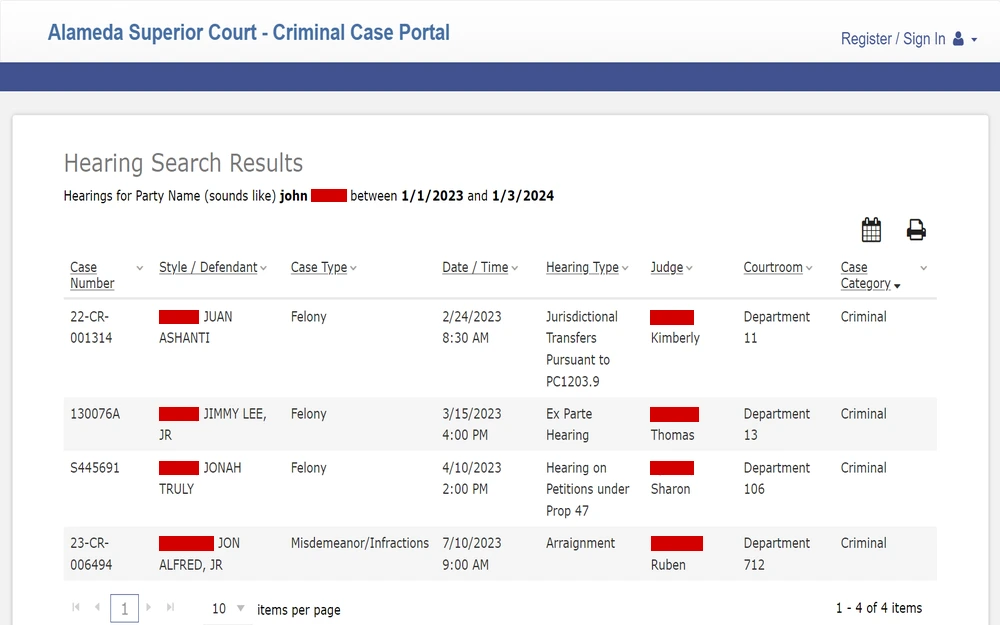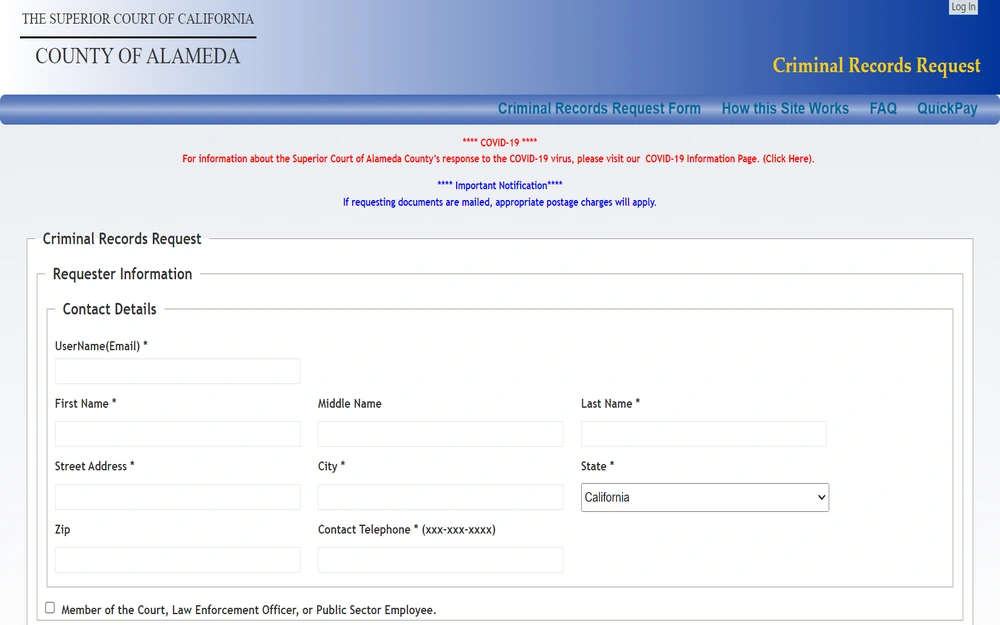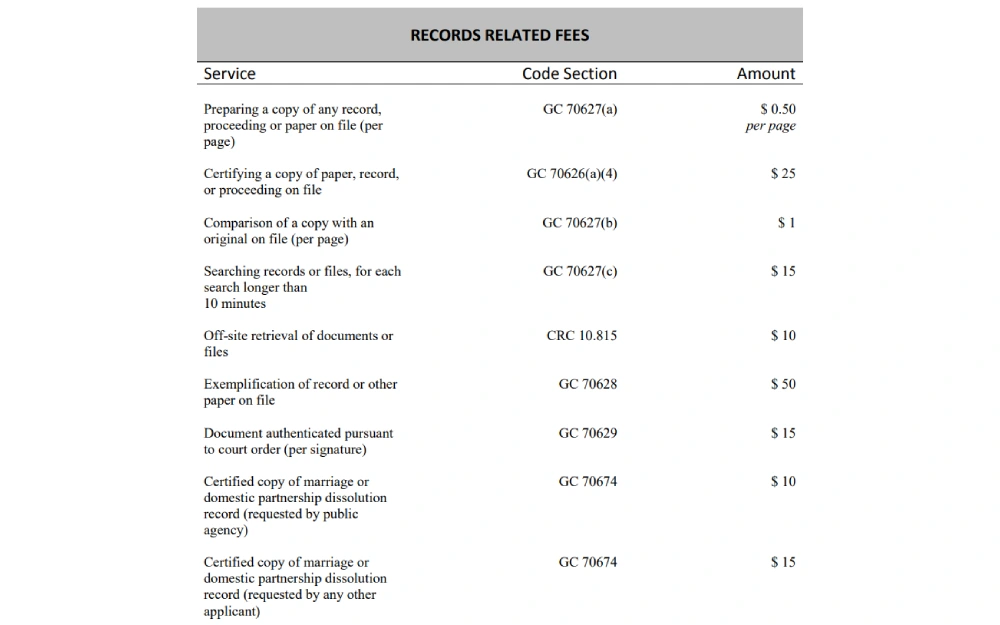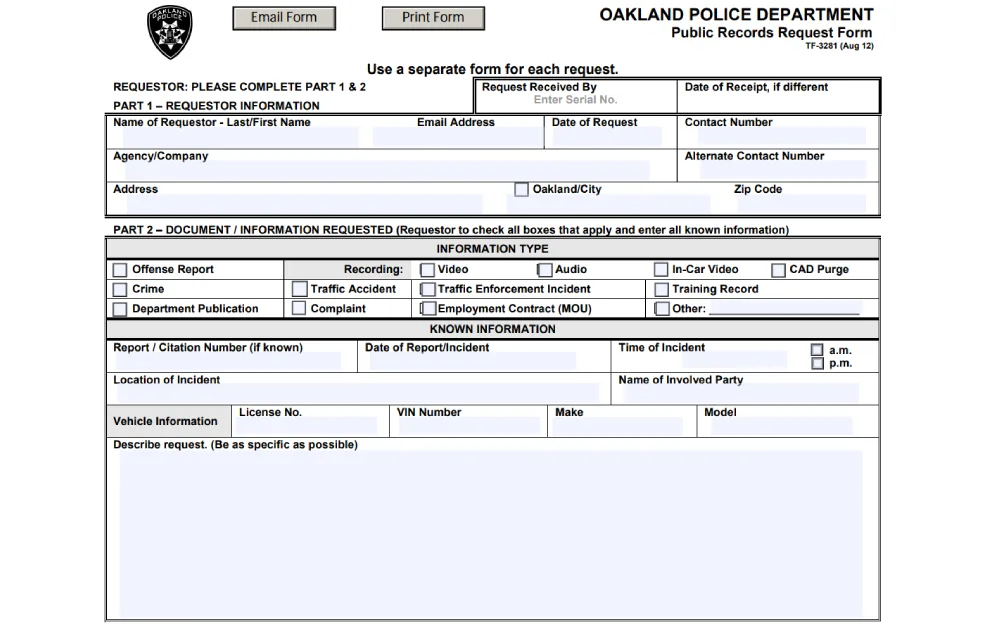Execute a free Alameda County warrant search to determine if you or your family and friends are wanted by law enforcement; you may also need to look up this information on suspicious individuals.
As a result of the California Public Records Act (CPRA) and the federal Freedom of Information Act (FOIA), warrant records are part of public data. Citizens can request warrant records from county and state agencies at no cost, though they may need to pay nominal charges for reproduction of documents.
This article provides helpful resources from official public agencies, such as aggregate links to aid citizens in their quest for warrant records in Alameda County, California.
An Overview of Looking Up Warrants in Alameda County
Before the acquisition of warrant records can commence, it is crucial to have some information on the subject of the search.
Most importantly, requesters will need to have the full name of the offender, and they will also need to know which county and state issued the warrant. Moreover, in some cases, having information such as date of birth (DOB) and physical description of the suspect can be helpful—this can be identifying tattoos, hair and eye color.
Warrant records are generated by courts and are issued by judges; they are thus part of court data accessible to the public due to California’s Public Records Act (CPRA).1 As a result, anyone can access these records without providing a reason. Nevertheless, citizens should utilize warrant records within the context of the law.
These records can be sought from the Superior Court of California in Alameda County and via the sheriff’s office. These agencies provide several ways to retrieve warrant information including online search tools, email, phone, mail and through in person visits.
The courts issue several types of warrants, including arrest, bench, fugitive and child support; these will be delved into in the following sections.
How To Conduct an Alameda County Warrant Search for Yourself or Someone Else
Interested persons who need to ascertain if they or someone else has an active or outstanding warrant may contact the Superior Court of California – County of Alameda and the sheriff’s office.2, 3 Citizens may view warrant records through online portals, by calling or visiting the agency or by mail.
View & Order Warrant Records via the Superior Court: Patrons may contact the Alameda Superior Court to find warrant information from court documents from any of the court’s divisions; however, these records are mostly found in criminal courts.4 Requesters can view court records from the criminal division, where the majority of the warrants will originate, and the civil court.5
Patrons may search for Alameda County Warrants online through the criminal court records database using the Odyssey Portal for free.6 Users can retrieve warrant data using party name, case number, court data, attorney name, etc. Individual case details cannot be seen; however, to determine whether the case is for these types of records, “Warrant” will appear under the hearing type column for the offender.

In addition, citizens may perform a criminal record request in person and online to ascertain warrant information.7 Users must furnish the relevant details such as the names of the subject of the search and what information is being sought in the criminal records application form.8

These frequently asked questions provide information on the costs and how to execute this search.9 For return of documents by mail, include a self-addressed envelope.
Warrants from civil records can be found online using the eCourt Public Portal and in person.10 Users may search through civil court records online but will need to register to use this portal.11
Furthermore, there is a fee for the name search bill tier which is $1.00 for one name search credit and $4.00 for five name search credits—please obtain the tier breakdown from the prior link. Patrons can search by case number, name search, calendar search and other criteria.
Requesters may also visit the courthouse that issued the warrant in person or call the numbers in the table below:
| Courthouse Name | Address | Phone |
| Wiley W. Manuel Courthouse – Oakland | 661 Washington Street Oakland, California 94607 |
(510) 627-4702 |
| Rene C. Davidson Courthouse – Oakland | 1225 Fallon Street Oakland, California 94612 |
(510) 891-6009 |
| Hayward Hall of Justice | 24405 Amador Street Hayward, California 94544 |
(510) 690-2703 |
| Fremont Hall of Justice | 39439 Paseo Padre Pkwy. Fremont, CA 94538 |
510.818.7501 |
| East County Hall of Justice – Dublin | 5151 Gleason Dr. Dublin, CA 94568 |
925.227.6792 |
Public access terminals and indexes in these court locations are free for public use. See this fee schedule for the costs of research and copying.12

Search Warrant Information via the sheriff’s office: Interested parties may also search for warrant records by contacting the Alameda County sheriff’s office’s Warrant & Records Division.13
The sheriff’s office does not have an online search portal to find warrant records, but patrons may either call 510.667.3685 or visit the address below to obtain this information. Please note that if the requestor appears at the law enforcement agency and has an active warrant, they may be taken into custody.
Alameda County Sheriff’s Office
Warrant & Records Division
2000 150th Avenue
San Leandro, California 94578
Retrieve Warrant Data from City Police Departments: It is possible to acquire warrant information from local police departments. For example, citizens can obtain public records from the City of Oakland Police Department, including warrants, either online or by email; these records will, however, only pertain to those within the jurisdiction of this law enforcement agency.14
Requesters can make a public records request online.15 They may also download and complete an application for public records form and email it to [email protected] or mail it to the address below.16 Patrons can call the public records request coordinator at 510.238.7143.

There may be a charge of record duplication billed at $0.05 per page. In 10 business days, the Oakland Police Department (OPD) will notify the requester whether or not the request can be fulfilled.
Oakland Police Department Records Section
Public Records Request Coordinator
Room 306, 455 7th Street
Oakland, California 94607
In addition, the residents in the county’s second most populated city, Fremont, can request warrant records. They may do so by contacting the Fremont Police Department Records Department by calling 510.790.6800 or emailing [email protected].17 However, citizens cannot find out if someone else has a warrant; they may only check for themselves.
Fremont Police Department
2000 Stevenson Boulevard
Fremont, California 94538
Types of Warrants & What They Stand For
Warrants are of a different variety, and they are this way because of the reason for the issue— for example, there are search orders which authorize law enforcement agencies to look through property.
In Alameda County, several types of warrants are furnished by the courts; the more common ones include arrest, bench, traffic and probation and parole. Warrants are a form of written orders signed by judges that authorize law enforcement agencies to take citizens into custody or search persons or property.
Warrants are enshrined in the Fourth Amendment of the U.S. Constitution and are issued due to probable cause since they infringe on citizen’s rights to be secure in their persons and houses.18
Arrest warrants are the most common form and authorize law enforcement officials to take offenders suspected of misdemeanors into custody; this is especially true for crimes which the police did not witness. It is not typical for courts to issue warrants for felonies if the law enforcement agencies have probable cause.
Furthermore, Ramey warrants are a form of arrest order issued in California that bypass the District Attorney’s Office—they are primarily implemented when there is a need to arrest someone over the weekend and to prevent any delays in taking someone into custody.
Bench warrants are a type of arrest order the courts issue when individuals fail to appear for their court obligations.
Judges sign alias warrants when an offender does not appear on a scheduled court date before a plea has been entered or does not respond to mail citations. In addition, child support warrants are issued to parents who have fallen behind in their payments, which can cause the production of a criminal arrest order.
Capias warrants occur when individuals have been found guilty by the courts and consequently failed to pay their fines. Search warrants are issued to allow for sweeping a person and property; judges only issue these if there is a probable cause based on evidence documented as a signed affidavit.
Fugitive warrants are sent from another state when an offender is in another jurisdiction. They are similar to Governor’s warrants, which cause offenders who have committed a crime out of state to be extradited.
Lastly, state and county agencies may authorize probation and parole warrants for offenders who have violated either supervision, particularly in the case of absconders.
How To Resolve a Warrant in Alameda County California
Once citizens establish that they or someone else has a warrant, several steps must be taken to resolve the arrest subpoena and prevent jail time, such as settling fines. When finding out someone else has a warrant, advising and alerting them to this fact is advisable as often people may not be aware of an outstanding arrest.
Nevertheless, there are scenarios where citizens investigate violent criminal offenders living in society. It is imperative not to take actions by themselves, but rather notify law enforcement of these individuals to uphold the safety of their persons and that of the community.
To resolve a warrant, individuals have several options at their disposal including hiring legal help and paying fines. Contact the courthouse that issued the warrants to obtain instructions on how to clear the warrant.19 Alternatively, individuals can contact the applicable law enforcement agency.
The list below provides a summary of actions to take to cure an outstanding warrant.
- Pay the fine that initiated the warrant.
- Set a court date to appear before the judge to prevent being taken into custody.
- Obtain legal counsel to help navigate the laws and aid in clearing a warrant.
- Sometimes, a court may require that the offender turn themselves in before hearing the outstanding warrant. In these situations, before turning oneself in, contact family, a lawyer and a bail bondsman to secure a bond release.
Running an Alameda County warrant search allows citizens to ascertain whether they have one; this article provides helpful resources to successfully do this at the county level, and advice on how to help clear warrants.
To dig deeper, you can also look up various free public records in Alameda County, from court case details and marriage documents to property ownership and local arrests.
References
1California Franchise Tax Board. (2023, April 11). California Public Records Act. Retrieved January 3, 2024, from <https://www.ftb.ca.gov/your-rights/california-public-records-act.html>
2Alameda County Superior Court. (n.d.). Records. Retrieved January 3, 2024, from <https://www.alameda.courts.ca.gov/general-information/records>
3Alameda County Sheriff’s Office. (n.d.). About us. Retrieved January 3, 2024, from <https://www.alamedacountysheriff.org/about-us>
4Alameda County Superior Court. (n.d.). Divisions. Retrieved January 3, 2024, from <https://www.alameda.courts.ca.gov/divisions>
5Alameda County Superior Court. (n.d.). Civil division. Retrieved January 3, 2024, from <https://www.alameda.courts.ca.gov/divisions/civil>
6Alameda County Superior Court. (n.d.). Case access. Retrieved January 3, 2024, from <https://publicportal.alameda.courts.ca.gov/publicportal/Home/Dashboard/26>
7Alameda County Superior Court. (n.d.). Criminal record requests. Retrieved January 3, 2024, from <https://www.alameda.courts.ca.gov/online-services/criminal-record-requests>
8Alameda County Superior Court. (n.d.). Criminal records search. Retrieved January 3, 2024, from <https://criminalrecords.alameda.courts.ca.gov:453/CRRWeb/>
9Alameda County Superior Court. (n.d.). FAQs – Criminal records search. Retrieved January 3, 2024, from <https://criminalrecords.alameda.courts.ca.gov:453/CRRWeb/Home/FAQ>
10Alameda County Superior Court. (n.d.). E-portal. Retrieved January 3, 2024, from <https://eportal.alameda.courts.ca.gov/>
11Alameda County Superior Court. (n.d.). Frequently asked questions. Retrieved January 3, 2024, from <https://eportal.alameda.courts.ca.gov/?q=node/388>
12Alameda County Superior Court. (n.d.). List of charges for records [PDF document]. Retrieved January 3, 2024, from <https://www.alameda.courts.ca.gov/system/files/list-charges-records.pdf>
13Alameda County Sheriff’s Office. (n.d.). Facility directory. Retrieved January 3, 2024, from <https://www.alamedacountysheriff.org/Home/Components/FacilityDirectory/FacilityDirectory/62/33?npage=2>
14City of Oakland, California. (n.d.). Police reports and documents. Retrieved January 3, 2024, from <https://www.oaklandca.gov/services/police-reports-and-documents>
15City of Oakland, California. (n.d.). NextRequest – Public records request portal. Retrieved January 3, 2024, from <https://oaklandca.nextrequest.com/>
16City of Oakland, California. (August 12). Document [PDF document]. Retrieved January 3, 2024, from <https://oaklandca.s3.us-west-1.amazonaws.com/government/o/OPD/s/document/dowd002885.pdf>
17Fremont Police Department. (n.d.). Records. Retrieved January 3, 2024, from <https://www.fremontpolice.gov/about-us/administrative-operations-division/records>
18Ronald Reagan Presidential Library. (n.d.). Constitutional amendments – Amendment 4: Right to privacy. Retrieved January 3, 2024, from <https://www.reaganlibrary.gov/constitutional-amendments-amendment-4-right-privacy>
19Alameda County Superior Court. (n.d.). Locations and contact information. Retrieved January 3, 2024, from <https://www.alameda.courts.ca.gov/general-information/locations-contact-info>
